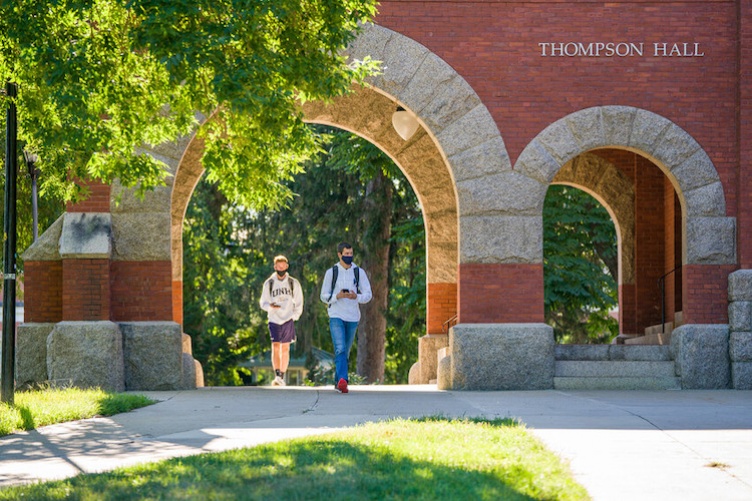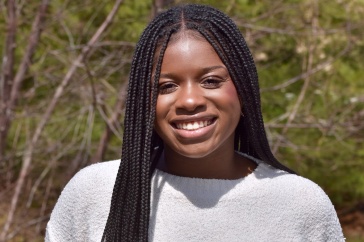
Four UNH students have received National Science Foundation Graduate Research Fellowships, given to students pursuing master's and doctoral degrees in science, technology, engineering and mathematics. Considered one of the foremost awards in the STEM fields, the five-year fellowship includes three years of financial support, with an annual stipend and tuition allowance.
In 2020, the National Science Foundation received over 13,000 applications for the graduate research awards and made approximately 2,000 offers to qualified students. UNH recipients include Morgan Saidel ’21 and Evan England ’21 and UNH graduate students Aliya Caldwell and David Heit. Graduating seniors Audrey Coleman ’21 and Tan Dao ’21, both physics majors, were awarded honorable mentions.

Morgan Saidel ’21 received her bachelor’s in physics in December and plans to attend the California Institute of Technology to pursue a Ph.D. in planetary science with a focus on exoplanets and planets in our solar system.
“Something that has always drawn me to planetary astronomy is the way it combines biology, chemistry and physics to understand how these planets and their atmospheres have evolved,” says Saidel. “With this grant I can continue to explore this multidisciplinary research while continuing to strive towards answering the question: Is life out there in the universe?”
Saidel first worked with professor Mark McConnell, researching high energy astrophysics. After that initial experience, he encouraged Saidel to pivot focus and explore her original childhood love of astronomy, setting the path for her current research and graduate school plans.
“I originally became interested in astronomy and astrophysics after watching 'Star Wars' as a little girl,” says Saidel. “I found myself enraptured by the different planets, by the jungle moons, desert planets, and icy worlds.”
An NSF Research Experience for Undergraduates (REU) at Cornell University provided the foundation for her current research on the development and progression of Martian dust storms.

Evan England ’21 is finishing their bachelor’s degree with a sociology major this May. But they aren't going anywhere. They are excited to begin the master’s program in sociology right here at UNH this fall.
A non-traditional student who explored a number of careers before beginning undergraduate work, England has found passion and focus in the social sciences and gender studies.
England’s graduate research will examine the LGBTQ inclusiveness of reproductive and sexual health services in a state-representative sample of 65 clinics throughout New Hampshire.
“These services, often referred to as ‘women’s’ health, can be alienating for transgender, transmasculine and non-binary people who need supportive access to these potentially life-saving screenings, treatments and counseling services,” says England.
“I hope that my research will provide important insight into LGBTQ+ inequality, gendered healthcare and impacts by rural or urban location,” they say, “and may help to reform healthcare delivery on the local, state and national levels.”
England’s award will give them the freedom and resources to address contemporary social issues head-on, they say, adding, “I also feel that, by awarding me this fellowship, the National Science Foundation is letting the country know that social research is a valuable and important element of STEM.”

Aliya Caldwell studies the prey selection by seabirds to understand their value as fisheries monitors and predictors. In particular, her work focuses on common terns in the Gulf of Maine and their prey, small fishes of both ecological and economic importance.
“The terns prey on young fishes before they are recruited into fisheries as adults, so I am trying to understand how the birds select those individuals from the environment — for example, do they prey selectively on certain species and sizes of fish — so that I can understand how tern diet might be used for monitoring and predicting fisheries.”
As an undergraduate at Rutgers University, Caldwell spent the past three summers doing research in the Gulf of Maine, primarily on plastic ingestion by seabirds in the system.
“I’ve been working on understanding how seabirds might be used as monitors of plastic pollution, so it was a natural switch to start thinking about how they could be used to understand fish populations,” she says.
After receiving her master's in marine biology, Caldwell says that with the receipt of the NSF graduate award she will transition into a Ph.D. program. Her goal is to pursue a post-doctoral position and continue her research on movement and trophic ecology in marine systems.
David Heit is pursuing his master's degree in natural resources and the environment. His research at UNH follows work he did as an undergraduate at Michigan State University examining the conceptual frameworks used to understand animal movement.

“Studying animal movement usually requires advanced quantitative models, each with several implicit and explicit assumptions. My research looks at how current research into animal movement may not adequately account for highly influential variables like topography and the scale of data collection,” Heit says. “For my thesis, I am investigating how spatial scale impacts analysis of habitat selection of white-tailed deer in Missouri.”
Heit says he has become increasingly fascinated with scientists who study nature, noting the work of analyzing and quantifying animal behavior takes many conscious and unconscious choices on behalf of the researcher, on what data to use or what statistical method to apply.
“My goal for my research here at UNH and beyond is to investigate these choices to see if they deliver the same accurate and meaningful insights into the natural world that we think they do,” he says.
Heit plans to pursue a Ph.D. in wildlife ecology, continue to study animal movement and eventually become a faculty researcher.
-
Written By:
Susan Dumais '88 '02G | College of Liberal Arts -
Written By:
Brooks Payette | College of Engineering and Physical Sciences
-
Compiled By:
Jody Record ’95 | Communications and Public Affairs | jody.record@unh.edu
















































